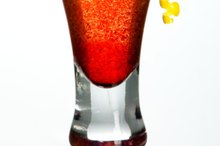The Effects of Alcohol on Oxygen Absorption
Alcohol does many things to the human body. It can make you happy, angry, relaxed and it can make you the life of a party. However, alcohol can also interfere with your body's ability to absorb oxygen. While the consumption of alcohol has become widely accepted as a social normalcy, many people who drink are unaware of the biological impact that alcohol has on their bodies.
Blood Alcohol Level
Alcohol is a substance that enters the bloodstream after being processed by the stomach, directly impacting the nervous system, liver, kidneys, lungs and other organs. Once you consume an alcoholic beverage your body develops a blood alcohol level. The BAL measures how much alcohol you have in your bloodstream in comparison to the other components that are normally found in your blood, such as oxygen. A high BAL indicates that the drinker has a higher proportion of alcohol in his blood than a low BAL would suggest. In this case, the higher level of alcohol challenges the person's oxygen proportions in the blood.
- Alcohol is a substance that enters the bloodstream after being processed by the stomach, directly impacting the nervous system, liver, kidneys, lungs and other organs.
- The BAL measures how much alcohol you have in your bloodstream in comparison to the other components that are normally found in your blood, such as oxygen.
Blood Sludging
Is Ginkgo Biloba Safe While Drinking Alcohol?
Learn More
Blood sludging is the clinical term used to describe the phenomenon between alcohol and your red blood cells, which, in turn, impacts your body's ability to absorb oxygen. Once alcohol has entered your bloodstream, it causes your red blood cells to clump together. The clumping makes it so that the small blood vessels become blocked or plugged. As a result, the tissues and organs in your body are unable to receive oxygen from the blood. Without oxygen, cells, tissues and organs cannot function properly.
- Blood sludging is the clinical term used to describe the phenomenon between alcohol and your red blood cells, which, in turn, impacts your body's ability to absorb oxygen.
- As a result, the tissues and organs in your body are unable to receive oxygen from the blood.
Oxygen Desaturation
Alcohol can lead to oxygen desaturation in the body. Oxygen saturation refers to the percentage of hemoglobin that is saturated with oxygen. According to the American Association of Critical Care Nurses, the normal value for oxygen saturation is between 97 percent to 99 percent 2. For an individual who drinks alcohol, the alcohol causes a desaturation effect, thereby reducing the oxygen absorption in hemoglobin. This impacts the tissues and organs in the body, causing them to experience a suffocation effect, as they are not receiving an adequate level of oxygen from the blood.
- Alcohol can lead to oxygen desaturation in the body.
- For an individual who drinks alcohol, the alcohol causes a desaturation effect, thereby reducing the oxygen absorption in hemoglobin.
Alcohol and the Brain
Causes of Low Blood Oxygen Levels
Learn More
When the brain does not get enough oxygen, either caused by blood smudging or desaturation, it can cause a drinker to pass out or black out. This typically occurs in severe cases of oxygen deprivation to the body, caused by a high quantity of alcohol in the bloodstream.
Related Articles
References
- American Association of Critical Care Nurses: Oxygen Saturation
- McGill University, Office for Science and Society, "Under the Microscope: Blood"
- Collins JA, Rudenski A, Gibson J, Howard L, O'Driscoll R. Relating oxygen partial pressure, saturation and content: the haemoglobin-oxygen dissociation curve. Breathe (Sheff). 2015;11(3):194–201. doi: 10.1183/20734735.001415
- Gossman W, Alghoula F, Berim I. Anoxia (Hypoxic Hypoxia) [Updated 2019 Jul 11]. In: StatPearls [Internet]. Treasure Island (FL): StatPearls Publishing; 2019 Jan-.
- Giaccia AJ, Simon MC, Johnson R. The biology of hypoxia: the role of oxygen sensing in development, normal function, and disease. Genes Dev. 2004;18(18):2183–2194. doi: 10.1101/gad.1243304
- Leach RM, Treacher DF. Oxygen transport-2. Tissue hypoxia. BMJ. 1998;317(7169):1370–1373. doi: 10.1136/bmj.317.7169.1370
- Hafen BB, Sharma S. Oxygen Saturation. [Updated 2019 Jun 2]. In: StatPearls Treasure Island (FL): StatPearls Publishing. 2019 Jan.
Writer Bio
Kyra Sheahan has been a writer for various publications since 2008. Her work has been featured in "The Desert Leaf" and "Kentucky Doc Magazine," covering health and wellness, environmental conservatism and DIY crafts. Sheahan holds an M.B.A. with an emphasis in finance.









